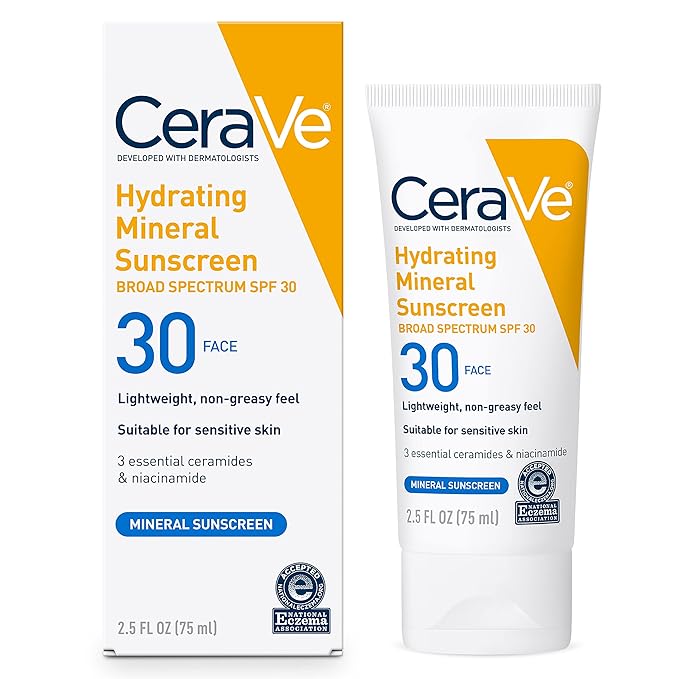The relationship between the sun and our skin is a delicate dance, one that can leave lasting impressions if not approached with care. We all yearn for that sun-kissed glow, but it’s essential to do so responsibly, with a trusted facial sunscreen by our side.
Join me as we dive into the best facial sunscreens for protection, ensuring that your skin remains a canvas of radiance while being shielded from the sun’s potential harm.
1. EltaMD UV Clear Broad-Spectrum SPF 46

Kickstarting our list is the EltaMD UV Clear Broad-Spectrum SPF 46, a dermatologist-recommended sunscreen known for its lightweight formula and broad-spectrum protection.
Ideal for sensitive skin, this sunscreen features transparent zinc oxide, niacinamide, and hyaluronic acid. It not only shields against UVA and UVB rays but also calms and protects sensitive or acne-prone skin.
Pros
- Lightweight and transparent formula.
- Suitable for sensitive or acne-prone skin.
- Contains niacinamide for additional skincare benefits.
Cons
- Pricier compared to some other options.
- May leave a slight white cast on deeper skin tones.
I incorporated EltaMD UV Clear into my daily routine, and its lightweight texture made it a joy to apply. The addition of niacinamide was a bonus, providing skincare benefits beyond sun protection. It quickly became a staple, offering reliable defense against the sun’s rays without compromising the health of my skin.
2. La Roche-Posay Anthelios Melt-in Milk Sunscreen SPF 60

For a sunscreen that feels luxurious on the skin, La Roche-Posay Anthelios Melt-in Milk Sunscreen SPF 60 is a standout choice. This sunscreen features Cell-Ox Shield technology for advanced protection against UVA and UVB rays.
With a velvety texture that blends seamlessly, it offers a high level of sun protection without leaving a greasy residue.
Pros
- Velvety texture that blends seamlessly.
- Advanced protection with Cell-Ox Shield technology.
- Water-resistant formula for lasting sun protection.
Cons
- Slightly higher price point.
- May feel a bit rich for those with oily skin.
This sunscreen was recommended by a friend with sensitive skin, and its effectiveness impressed me. The velvety texture felt luxurious on the skin, and the water-resistant formula made it suitable for outdoor activities. It’s a reliable option for those seeking high sun protection with a touch of indulgence.
3. Neutrogena Hydro Boost Water Gel Lotion SPF 30

Combining sun protection with hydration, the Neutrogena Hydro Boost Water Gel Lotion SPF 30 is a stellar choice for those looking for a lightweight and moisturizing formula.
Infused with hyaluronic acid, this sunscreen offers broad-spectrum protection while providing a burst of hydration, leaving your skin feeling refreshed.
Pros
- Lightweight water gel texture.
- Hyaluronic acid for added hydration.
- Affordable option with broad-spectrum SPF.
Cons
- Lower SPF compared to some other options.
- May not be water-resistant for extended periods.
My sister, who has combination skin, introduced me to this sunscreen, and I was impressed by its lightweight texture.
The addition of hyaluronic acid provided a boost of hydration without feeling heavy. It’s an excellent option for daily use, especially for those with normal to combination skin.
4. Supergoop! Unseen Sunscreen SPF 40

A sunscreen that goes beyond protection to provide an invisible shield, Supergoop! Unseen Sunscreen SPF 40 is a game-changer.
With a clear, velvety formula, this sunscreen glides on effortlessly, leaving no white cast. It offers broad-spectrum protection and acts as an excellent primer under makeup.
Pros
- Clear, velvety formula.
- Acts as a primer under makeup.
- Broad-spectrum protection without a white cast.
Cons
- Relatively higher price point.
- May not be as moisturizing for those with dry skin.
5. Biore UV Aqua Rich Watery Essence SPF 50+

Hailing from Japan, Biore UV Aqua Rich Watery Essence SPF 50+ is a cult favorite for its lightweight texture and high SPF. This sunscreen features a watery essence that absorbs quickly into the skin, leaving a fresh and dewy finish. It provides effective protection against both UVA and UVB rays.
Pros
- Lightweight watery essence texture.
- High SPF for enhanced sun protection.
- Quick absorption without a sticky residue.
Cons
- May not be as readily available in local stores.
- The fragrance may be overpowering for some individuals.
6. CeraVe Hydrating Mineral Sunscreen SPF 30

For those who prioritize mineral-based sunscreens, CeraVe Hydrating Mineral Sunscreen SPF 30 is an excellent choice. Formulated with zinc oxide and hyaluronic acid, this sunscreen offers broad-spectrum protection while hydrating the skin.
It’s suitable for sensitive skin and provides a gentle and nourishing shield against the sun.
Pros
- Mineral-based with zinc oxide.
- Hyaluronic acid for added hydration.
- Suitable for sensitive skin.
Cons
- Slightly thicker consistency.
- May leave a subtle white cast on deeper skin tones.
Buying Guide
Selecting the right facial sunscreen involves considering various factors to ensure that it aligns with your skin’s needs and your lifestyle. Here’s a comprehensive buying guide to assist you in making an informed decision:
SPF Level
The Sun Protection Factor (SPF) indicates the level of protection a sunscreen provides against UVB rays. Choose a facial sunscreen with an SPF of at least 30 for daily use, and consider higher SPF levels for extended outdoor activities.
Broad-Spectrum Protection
Ensure that the facial sunscreen offers broad-spectrum protection, guarding against both UVA and UVB rays. This comprehensive protection is crucial for minimizing the risk of sun damage and premature aging.
Skin Type
Consider your skin type when selecting a facial sunscreen. Different formulations cater to various skin needs, from lightweight options for oily skin to hydrating formulations for dry or sensitive skin.
Ingredients
Examine the ingredients list to ensure that the facial sunscreen aligns with your skincare goals. Look for additional skincare benefits such as antioxidants, hyaluronic acid, or niacinamide to enhance the overall health of your skin.
Water Resistance
If you plan on swimming or engaging in water-related activities, choose a facial sunscreen labeled as water-resistant. Keep in mind that water resistance varies, so reapplication may be necessary after swimming or excessive sweating.
Texture and Finish
Consider the texture and finish of the facial sunscreen, keeping in mind your preferences and makeup routine. Some sunscreens offer a matte finish, making them suitable for oily skin, while others provide a dewy or invisible finish.
Fragrance
Check for fragrance-free or hypoallergenic options, especially if you have sensitive skin. Fragrances can sometimes cause irritation, so opting for sunscreen without added scents may be gentler on the skin.
Reapplication
Be mindful of how often you need to reapply the facial sunscreen. Some formulations may require more frequent reapplication, especially if you are sweating or exposed to water.
Brand Reputation
Consider the reputation of the brand when making your selection. Brands with a history of skincare expertise and positive customer reviews are more likely to deliver quality facial sunscreens.
Price
Set a budget for your facial sunscreen investment, keeping in mind that the cost can vary based on factors such as brand, SPF level, and additional skincare ingredients. Balance the price with the features and benefits that align with your skincare needs.
Conclusion
The journey to finding the perfect facial sunscreen involves a careful consideration of your skin’s needs, preferences, and lifestyle. The top picks highlighted in this guide cater to various requirements, ensuring that you can enjoy the sun responsibly while keeping your skin nourished and radiant.
Frequently Asked Questions
1. How much facial sunscreen should I apply?
The general recommendation is to apply a nickel-sized amount of facial sunscreen for the face and a quarter-sized amount for the face and neck combined. However, individual needs may vary, so adjust the amount based on your coverage area and skin type.
2. Can I apply facial sunscreen under makeup?
Yes, most facial sunscreens are designed to be applied under makeup. In fact, some sunscreens, like Supergoop! Unseen Sunscreen, acts as an excellent primer for makeup, providing an additional layer of protection without compromising the finish of your makeup.
3. Do I need to reapply facial sunscreen throughout the day?
Yes, reapplication is crucial for maintaining effective sun protection. Ideally, reapply facial sunscreen every two hours or more frequently if you are sweating or exposed to water. If you are wearing makeup, consider using a sunscreen spray or powder for easier reapplication.
4. Can I use facial sunscreen on other parts of my body?
While facial sunscreens are specifically formulated for the face, you can use them on other exposed areas of the body. However, it’s advisable to use body-specific sunscreens for larger areas to ensure proper coverage.
5. What is the difference between chemical and mineral sunscreens?
Chemical sunscreens contain organic compounds that absorb UV rays, while mineral sunscreens use physical blockers like zinc oxide or titanium dioxide to reflect and scatter UV rays. Both types provide effective sun protection, but individuals with sensitive skin may prefer mineral-based options.
6. How long does a bottle of facial sunscreen last?
The longevity of a bottle of facial sunscreen depends on factors such as the size of the bottle, the frequency of use, and the amount applied. On average, a standard-sized bottle may last for a month or more with daily use, but this can vary.



